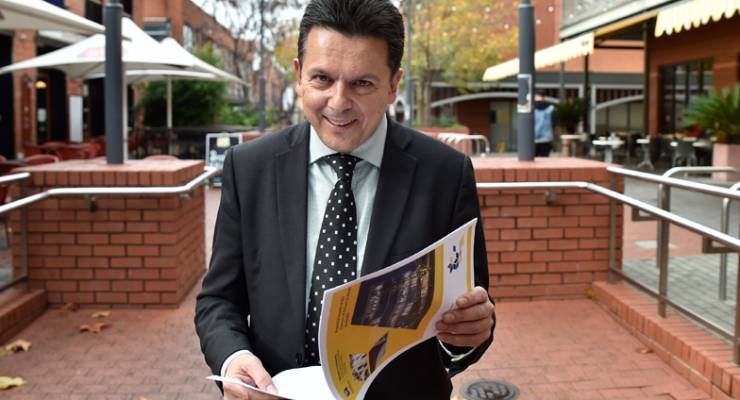
The zone of uncertainty surrounding the result of Saturday’s election has widened still further over the past few days, amid the global shockwaves set off by last week’s Brexit referendum.
In lashing out against both sides of their country’s political establishment, voters in Britain followed a pattern that has been evident throughout the democratic world over recent years, which has been harnessed by actual or self-described outsiders of both left (Bernie Sanders, Jeremy Corbyn) and right (Donald Trump, Nigel Farage, various nationalists throughout Europe).
So far, at least, manifestations of this phenomenon in Australia have taken ideologically mild forms, but this offers limited comfort to the major parties and their leaders.
For Malcolm Turnbull in particular, the knowledge that his poll ratings look sufficient to get him over the line against Labor is tempered by concern that minor party and independent rebellions in normally safe seats could yet bring on the public relations disaster of another hung parliament.
[Brexit — the shockwaves spread out from a departing Britain]
Published polls have found two of the leading actors in the last hung parliament, Tony Windsor and Rob Oakeshott, to be remarkably competitive in comeback bids launched just three years after both chose to bow out, having all but scuppered their electoral prospects through their association with Julia Gillard’s government.
Even more troublingly for the Coalition, it remains very difficult to tell how much of a bite the Nick Xenophon Team will take out of its South Australian contingent.
Electorate-level polls suggest the threat to be particularly menacing in the seats of Mayo and Grey, respectively held by Jamie Briggs and Rowan Ramsey, and reports indicate the Liberals are no less concerned about the seat of Barker, held by Tony Pasin.
Mayo, which covers the Adelaide Hills and Fleurieu Peninsula, has form when it comes to Liberal heartland rebellion, having very nearly been lost to the Australian Democrats in 1998.
By contrast, the electorate of Barker, which encompasses the Riverland and Mount Gambier, is as settled as any seat can be. The conservative grip on the seat has not slackened at any time since its creation in 1903, and the last time there was a genuinely close result was during the Second World War.
Grey encompasses the majority of the state’s surface area, but its largest population centres are the “iron triangle” towns of Port Pirie, Port Augusta and Whyalla, which in happier times provided a large base of blue-collar workers who usually kept the seat in Labor hands.
However, a tipping point arrived when it fell to the Liberals in 1993, and Labor has not seriously been competitive since.
In Barker and Grey especially, the extent of the NXT threat has surprised a Liberal Party that did not have campaign infrastructure in place to meet the challenge.
The situation across the three electorates illustrates the confounding way in which independent and minor party insurgencies cut across conceptions of safe and marginal seats born of the lost certainties of the two-party system.
For a party like NXT, the path to victory usually involves overtaking one or other major party and riding home the other on their preferences.
Such an outcome is that much more difficult to achieve when two evenly balanced major parties present equally high hurdles, as is the case in conventionally marginal seats.
The strongest opportunities exist where one of the major parties is clearly stronger than the other, without being so strong that its primary vote places it beyond challenge.
It is for this reason that the NXT’s strongest opportunities appear to be in conservative country electorates, despite the fact that Xenophon’s Senate vote in 2013 was higher in Adelaide.
[Xenophon is coming — and disruption follows with him]
On one level, the anti-establishment sentiment expressed by the Brexit result might be seen to encourage bullish views for Xenophon’s prospects, and indeed those of other populists including Jacqui Lambie, Pauline Hanson and Derryn Hinch.
However, a corrective to that view was provided on Sunday by voters in Spain, a country not often noted as a source of instructive parallels for Australian politics.
The result of Spain’s election confounded opinion pollsters, as so many elections around the world have done in recent years.
But whereas elections in Denmark, Poland and Austria surprised with the strength of support for political outsiders, this time it was the mainstream conservative and centre-left parties that exceeded expectations, and the hard left Podemos that fell short.
It was difficult to avoid the conclusion that voters had doused their rebellious spirits after observing the political and economic mayhem that engulfed Britain as soon as the referendum result became known.
Australian voters might likewise be feeling less inclined than usual to write off Malcolm Turnbull’s pronouncements about the need for certainty amid an unstable global environment as so many election campaign platitudes.
Whether this plays to the disadvantage of Xenophon, with his carefully projected image of non-ideological centrism, is one of many things about this election that we won’t know with any certainty until Saturday night.
*To read more from Crikey‘s William Bowe, visit The Poll Bludger








Crikey is committed to hosting lively discussions. Help us keep the conversation useful, interesting and welcoming. We aim to publish comments quickly in the interest of promoting robust conversation, but we’re a small team and we deploy filters to protect against legal risk. Occasionally your comment may be held up while we review, but we’re working as fast as we can to keep the conversation rolling.
The Crikey comment section is members-only content. Please subscribe to leave a comment.
The Crikey comment section is members-only content. Please login to leave a comment.